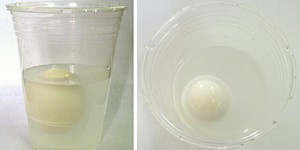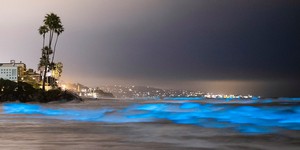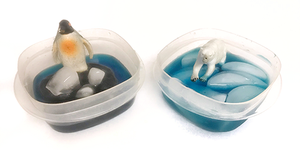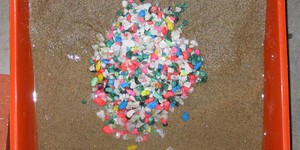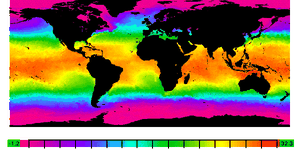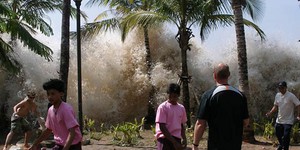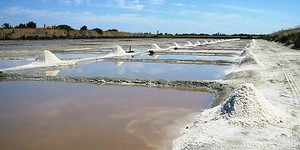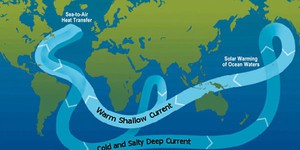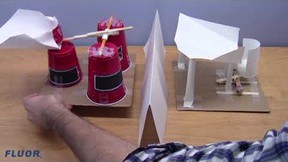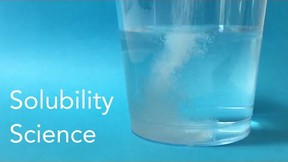Ocean Sciences Science Experiments (23 results)
Fun science experiments to explore everything from kitchen chemistry to DIY mini drones. Easy to set up and perfect for home or school. Browse the collection and see what you want to try first!
About 70% of Earth's surface is covered by oceans but humans have only explored 5% of the ocean! From microscopic phytoplankton to pods of whales and global weather patterns there is a lot left to discover.
|
Select a resource
Sort by
|
Some objects float on top of the ocean, and other objects sink to the bottom. Why? Try this eggsperiment to find out!
Read more
Imagine the ocean water turning bright red or seeing ocean waves glowing a beautiful blue color. Sounds impossible—but it is not! Red tides and glowing waves are caused by microscopic organisms living in the ocean called dinoflagellates. Some dinoflagellates have the ability to produce light through a process called bioluminescence. When and how do these organisms glow? In this science project, you will investigate how changing the dinoflagellate's exposure to light and dark affects its…
Read more
STEM Activity
153 reviews
Have you ever wondered why some objects float on top of the ocean, and other objects sink to the bottom? It has to do with the density of the objects compared to the density of the salt water surrounding them in the ocean. If you add salt to plain water, it increases the density of the water. In fact, if you add enough salt, you can make the water so dense that an egg will actually float in it! Explore how this works in this science activity.
Read more
STEM Activity
68 reviews
Have you ever noticed that if you leave an ice cube out on the kitchen counter and come back to check on it in a while, you find a puddle? The same thing happens to ice in nature — if the temperature gets warm enough, the ice melts. In this science activity, you will explore what happens to sea levels if the ice at the North Pole melts, or if the ice at the South Pole melts. Does melting ice at either cap contribute to a rise in sea levels? It is an especially important question for…
Read more
A day at the beach is a wonderful way to spend time with your family and friends. You can swim, play games, and build sand castles. But have you ever thought about how all of that sand got there and wondered why the shoreline weaves in and out of the ocean? In this science project, you will investigate how ocean waves build beaches by making a model of the beach and shoreline. All you need is a tiny surfer and a beach volleyball court for your model, and you can imagine that you are in…
Read more
Of course it can, you say: ice is water and ice floats! And you're right. But we're talking about water in the liquid phase (the title reads better without getting overly specific). So how about it? Can liquid water float on water? Check out this project to find out.
Read more
A tsunami is a series of waves made in a body of water, like the ocean, that can cause serious destruction when they hit the coastline. In deep water, a wave can be just a few feet high and travel very fast. As it nears the coastline, and moves into shallower water, tsunamis usually slow down, but the wave height can grow to 100 feet! In this ocean science project, you will model a tsunami and investigate how wave velocity (speed) depends on water depth. Does it match the mathematical equation…
Read more
The oceans are a precious natural resource, part of Earth's carbon cycle. But what happens if the oceans absorb too much carbon dioxide? Many scientists are concerned that the increased absorption of carbon dioxide is causing them to become more acidic. What impact does that have on the marine life? In this ocean science fair project, you will demonstrate ocean acidification and investigate the effect on the shells of marine life.
Read more
Have you ever been swimming at the beach and gotten some water in your mouth by mistake? Then you know that the ocean is very salty. But what about other bodies of water? How much salt do they have compared to the ocean?
Read more
Ocean currents have profound effects on the climates of the continents, especially those regions bordering on the ocean. For example, the Gulf Stream (a warm current that goes around the North Atlantic Ocean) is thought to make northwest Europe much warmer than it would otherwise be. Similarly, the California Current is thought to keep Hawaii cooler than other land masses at the same latitude as it. In this ocean science fair project, you will model the behavior of these "rivers" of hot and…
Read more
|


